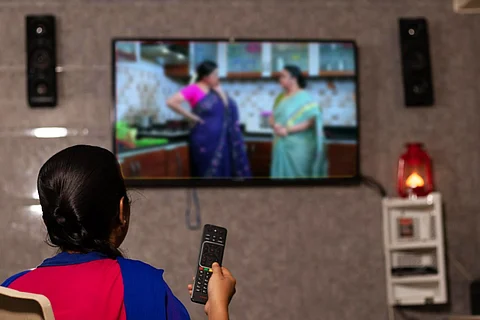

In a television programme, the newly sworn-in Kerala Minister for Culture, Saji Cherian, said in answer to a question that the government will consider censorship of television serials. Malayalam television serials propagate unscientific, anti-progressive and superstitious content, and the government will seriously consider having a censor board, the minister said.
The first Malayalam serial was aired in Doordarshan in 1990. In those early days, serials followed a 13-episode format, telecast once a week. However when more entertainment channels cropped up, the episodes stretched to a thousand or more in number. Multiple serials got aired on multiple channels every day for several hours. Increasingly, the content got criticised for often depicting distasteful subjects as domestic abuse, enmity between women of home and harassment by in-laws.
Watch: Minister Saji Cherian on TV serials
“It is the need of the hour, considering the kind of regressive content we get to see on a daily basis,” says critic Neelima Menon on censorship of television serials. “If possible they should extend this censoring to some of those awful comedy reality shows which promote racism and sexism unapologetically. Even those reality shows with children,” she adds.
‘Impractical move’
So far, television serials are not known to be censored in any part of the country. Actors and people working in the industry say it is simply impractical. “We will definitely welcome such a move by the government if it proposes to have a censorship of the content. However it is a question if it is practical to do this. There are about 30 television serials aired on the various Malayalam channels now. Each of these is about 30 minutes long. That is 900 minutes or 15 hours of content every day. Where is the time or strength to go through such enormous content?” asks P Dinesh Paniker, actor and general secretary of the Association of Television Media Artistes (ATMA).
He says it’d be much easier if the government instead gave them a set of guidelines that is to be followed while making serials. “It could contain what is objectionable and the makers could accordingly avoid such content. Alternately, they could also allow us self-censorship and interfere if they feel the content is still very objectionable,” says Dinesh.
There is the bigger question of whether censorship of any kind is advisable in any format of broadcasting. “On the big issue of censorship, it is of course a bad idea,” says NS Madhavan, writer and social commentator.
“So far in TV they are following self-regulation. Road to hell is paved with good intentions. Anyway pretty little can be done at the state level. The types of serials mentioned by the minister are violative of programming and advertising codes, and what the state government can do is to forcefully bring them to the notice of the centre,” he adds.
Nearly 20 out of the 30 serials aired in Malayalam channels are remakes of serials in other channels, adapted to suit the Kerala culture. “But I don’t know how far this is successful, the adaptation to our culture. Only in that way do I doubt if there is anything problematic about the content. Otherwise, I am not sure what the minister meant when he said it is superstitious and dangerous content that we air,” says serial actor and executive member of ATMA, Sajan Surya.
Identifying with the victims
Serials do not have the time and luxury that movies do. These are sometimes shot on the morning of the day it is aired, says Seema G Nair, television and film actor. “It would have been possible in the days we had 13-episode serials shot much in advance, or even at a time there were 25-episode series. Now it is simply impractical. And all this criticism is based on an idea that crimes are influenced by content in serials. Domestic abuse or harassment by in-laws have always existed long before serials came into being. So saying that a person would be wrongly influenced by serials or films is not right,” Seema says.
Kochi-based psychiatrist Dr CJ John does not agree. There is a certain identification with the victim happening among the elderly who watch serials, he says. “There is a lot of exaggerated content on extramarital affairs or wicked and evil women who plot against each other. The makers may have to add richness or unreal colour that will attract the audience. But many among the elderly or women population sitting at home – who are the biggest audience of serials – may be affected. As in their attitude to life or to other people may change,” he says.
Most young people have switched to streaming platforms and web series and it is often the elderly that is still glued to prime time serials, Dr John notes. “They start wondering if the daughter-in-law is going to harm them (like in the serial). It is a vulnerable, marginalised segment who can readily identify with such victims and end up misinterpreting what’s depicted.”
He remembers a discussion at a literary fest when a serial maker spoke of the pressures given by channels in adding such content to increase ratings. “It takes a socially committed creative mind to avoid such negative depictions. I must say news reporting is also not far behind when it comes to negative depictions. But I don’t know how far a censoring mechanism will help, considering that it is not properly done for movies itself,” Dr John adds.